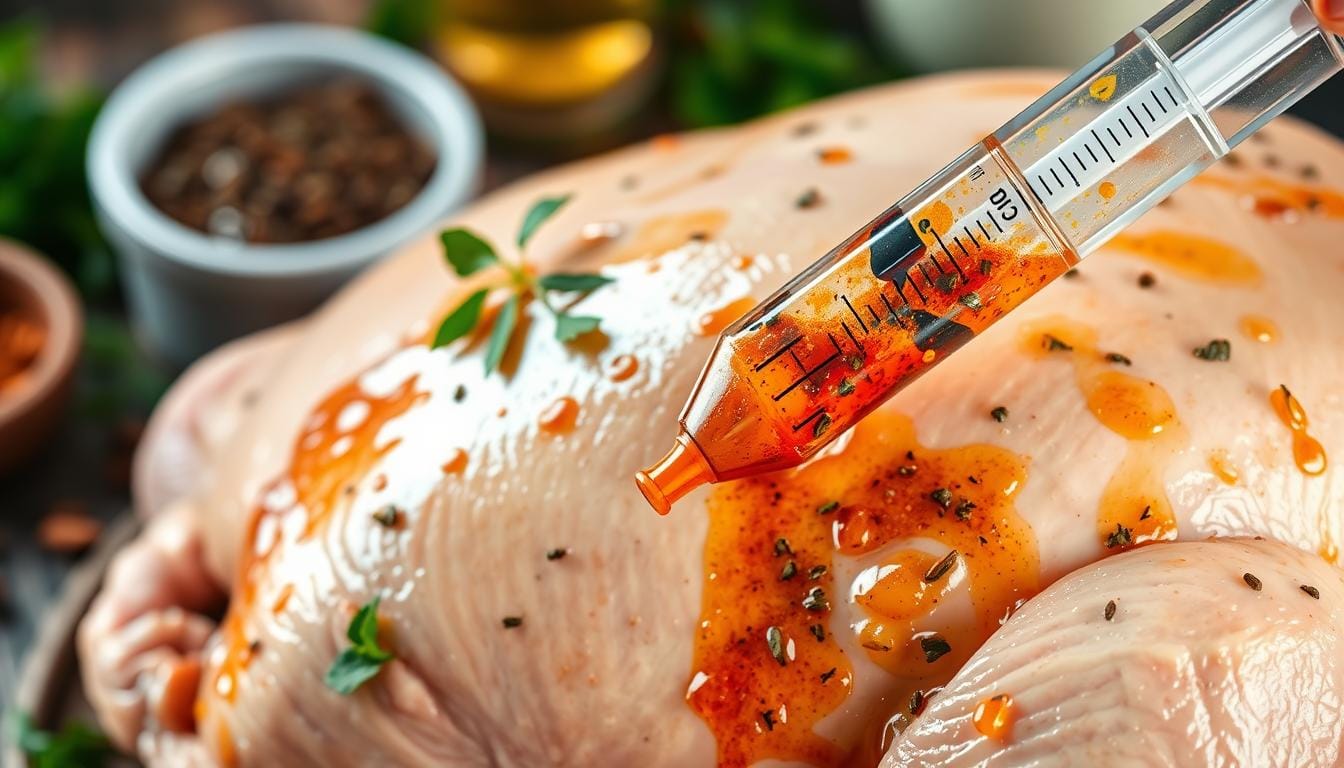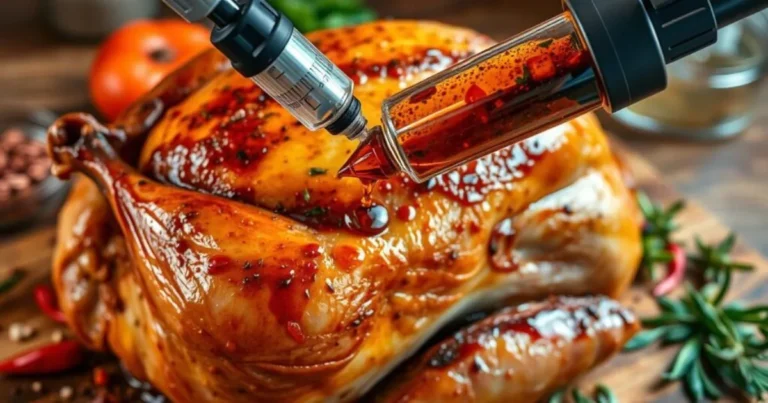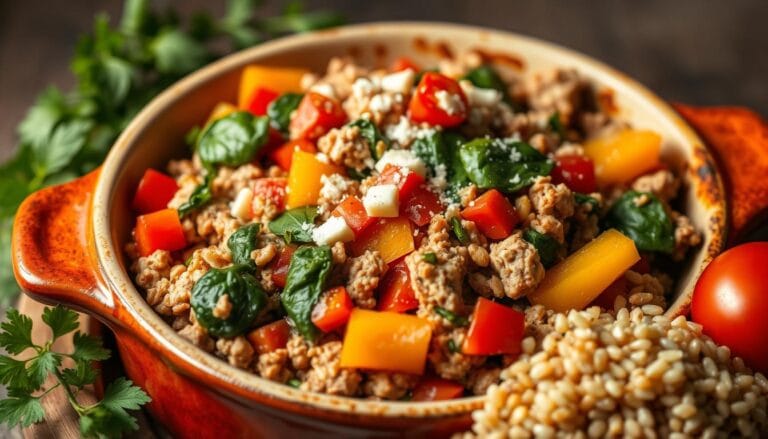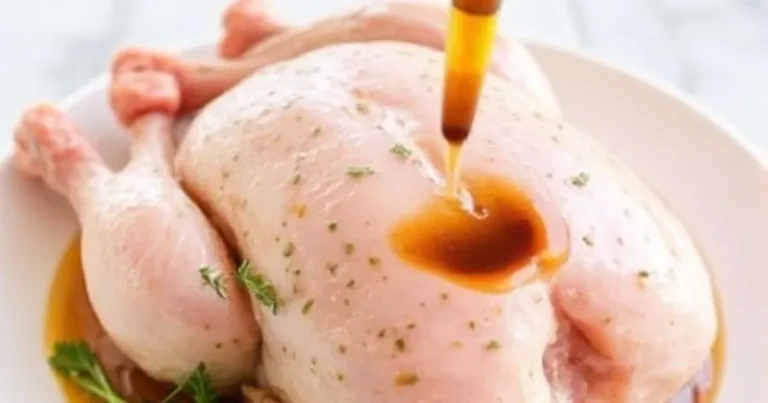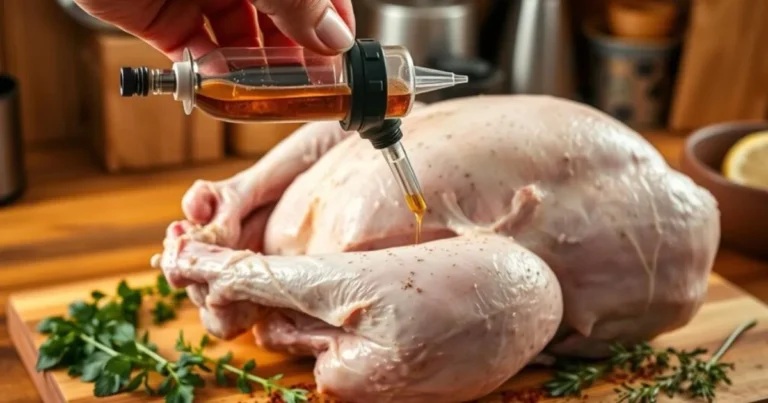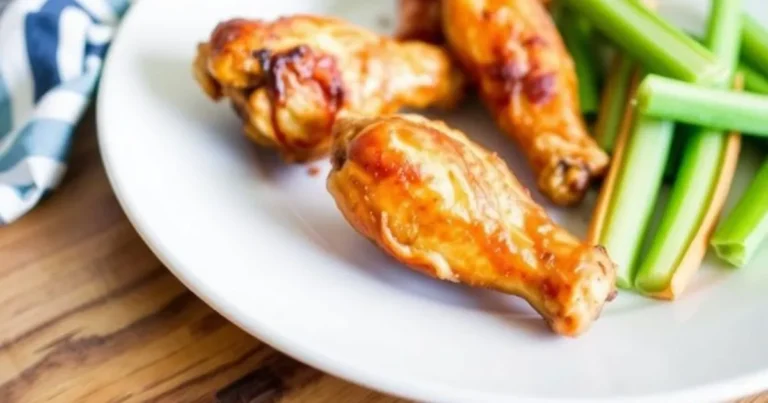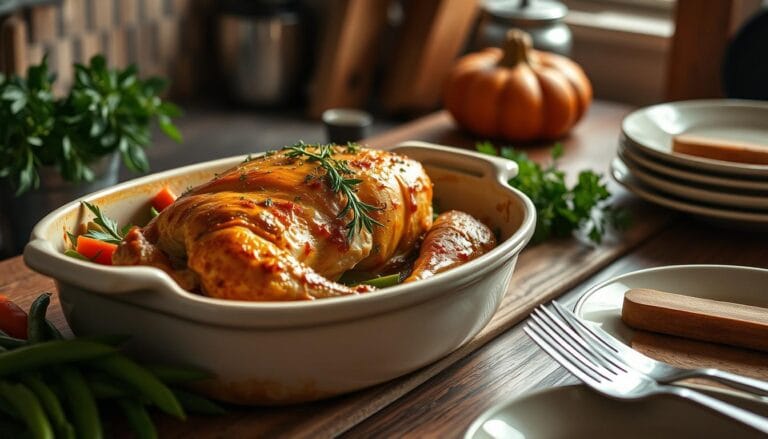How to Prepare Marinades for Injecting Turkey for Juicy Results
Every Thanksgiving, I used to struggle with dry, tasteless turkey. But then I found turkey marinade injections. Now, I serve a juicy, flavorful turkey that everyone loves.
Turkey marinade injections are a big deal in cooking. They make sure your turkey is juicy and full of flavor. Unlike surface marinades, these injections get flavor deep into the meat.
Learning how to inject turkey marinades opens up new cooking possibilities. It’s perfect for any big meal or a cozy family dinner. Your turkey will always be moist and full of flavor.
Table of Contents
Understanding Turkey Injection Marinades and Their Benefits
Turkey preparation has changed a lot with the use of injection marinades. These methods add a new twist to making juicy, flavorful turkey. They go beyond just marinating the surface.
Injecting turkey with marinade does more than add flavor. It changes the whole cooking experience. The marinade goes deep into the meat, making every bite juicy and full of taste.
Why Injection Outperforms Surface Marinades
Surface marinades only cover the outside, leaving the inside tasteless and dry. Injection marinades are different:
- They go deep into the meat
- Spread flavor all through
- Help keep the meat moist
- Make the taste more even
Benefits of Internal Flavor Distribution
Using injection techniques brings many benefits:
| Benefit | Impact |
|---|---|
| Flavor Penetration | 100% deeper than surface marinades |
| Moisture Retention | Up to 3-5% more juicy |
| Seasoning Consistency | Flavor is evenly spread |
Impact on Meat Moisture Retention
The science behind injecting turkey is amazing. Salt and phosphates help keep water in the meat. This keeps the turkey juicy and tender, avoiding dry meat.
“Injection marinades turn an ordinary turkey into a culinary masterpiece. They add flavor and moisture from the inside out.”
Essential Equipment for Turkey Injection
When you’re making an injected marinade for turkey, the right tools are crucial. A top-notch meat injector is key. It turns a regular turkey into a flavorful main dish.
- Meat Injector with Multiple Needle Sizes
- ATBBQ Meat Injector with 50cc barrel
- Replaceable needles for different marinade consistencies
- Digital Thermometer
- ATBBQ Digital Thermometer with under 2-second read time
- Ensures safe internal turkey temperature of 165°F
- Protective Gear
- ATBBQ Long Leather BBQ Gloves (16-inch coverage)
- Protects against oil splatters during preparation
“The right tools transform a good turkey into an exceptional culinary experience.”
Your meat injector should have certain features for turkey injection:
- Wide mouth for easy liquid loading
- Sturdy construction
- Multiple needle sizes
- Easy-to-clean design
Pro tip: Pick an injector that lets you load from the top or use needle-hole suction. This makes preparing your turkey marinade easier.
Basic Ingredients for Marinades for Injecting Turkey
To make the best brine injections for turkey, you need to know the right mix of ingredients. When making seasoned turkey injections, focus on three main parts. These parts work together to add flavor and keep the turkey moist.
Your turkey injection marinade will make about 1½ cups. This is enough for 16 servings, with a rich, deep flavor. Let’s look at the key ingredients that make your marinade stand out.
Liquid Base Components
The base of a great turkey injection is liquid bases. They add moisture and depth. Here are the main options:
- Chicken stock (¾ cup)
- Lemon juice (2 tablespoons)
- Unsalted butter (½ cup)
- Room temperature broth
Seasoning and Flavor Enhancers
Dry spices are what turn your brine injections for turkey into something amazing. A good mix includes:
- Salt (2 teaspoons)
- Garlic powder (1 teaspoon)
- Onion powder (1 teaspoon)
- Ground herbs: thyme, sage, oregano (1 teaspoon each)
- Black pepper (1 teaspoon)
- Paprika (1 teaspoon)
Fat-Based Ingredients
Fat is key for juicy, flavorful seasoned turkey injections. The main fats are:
- Unsalted butter
- Olive oil
- Chicken fat
Pro tip: Make sure all ingredients are at room temperature. This helps mix well and get the best injection results.
Each tablespoon of your marinade has about 72 calories. It also has 6g total fat and important flavor boosters.
Classic Butter and Herb Injection Recipe
Making the perfect turkey injection recipes needs care and the right mix of ingredients. This classic butter and herb injection will make your holiday turkey amazing. Every bite will be full of rich, deep flavor.
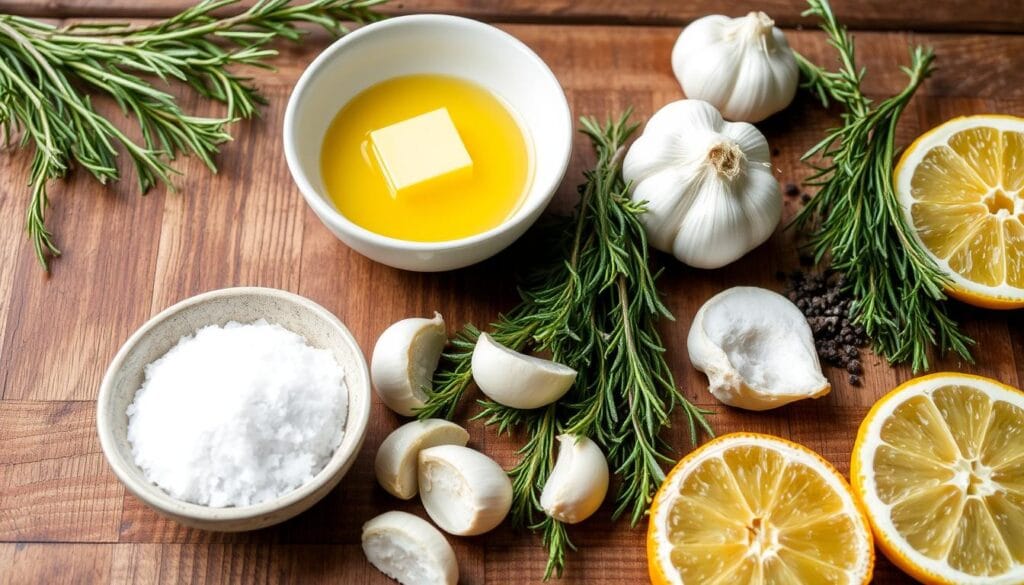
Your turkey injection marinade will have a great mix of fresh herbs and savory things. It’s all about finding the right balance. You want to enhance the turkey’s natural taste while adding moisture and depth.
Ingredients for Turkey Injection
- 1/2 cup chicken broth
- 4 tablespoons unsalted butter
- 1 tablespoon Worcestershire sauce
- 1/2 teaspoon lemon juice
- 1 1/2 teaspoons minced garlic
- Fresh herbs: thyme, rosemary, sage
- 1/2 teaspoon kosher salt
- 1/8 teaspoon ground black pepper
Preparation Steps
- Melt butter in a small saucepan
- Add chicken broth and herbs
- Whisk in seasonings until fully combined
- Cool mixture to room temperature
Great turkey injection recipes say to use about 1/2 ounce of marinade for every 5 pounds of turkey. This helps spread the flavor evenly without making the meat too wet.
“The secret to a juicy turkey is not just in the cooking, but in the preparation.” – Professional Chef
Nutrition Highlights
| Nutrient | Amount per Serving |
|---|---|
| Calories | 253 kcal |
| Carbohydrates | 46 g |
| Sodium | 2806 mg |
Pro tip: For the best results, inject your turkey the night before cooking and let it rest in the fridge. This lets the flavors soak deep into the meat. Your turkey will be more succulent and flavorful.
Preparing Your Turkey for Injection
Injecting turkeys with flavor needs careful preparation. Turning an ordinary turkey into a masterpiece starts before you inject it.
Getting your turkey ready involves several key steps. These steps ensure great taste and safety. Knowing these steps will help you get delicious results every time.
Proper Thawing Methods
Thawing your turkey correctly is crucial for flavor injection. Follow these important guidelines:
- Thaw turkey in refrigerator at 40°F or below
- Allow 24 hours of thawing for every 4-5 pounds of turkey
- Never thaw turkey at room temperature
- Use cold water method for faster thawing if needed
Sanitization and Food Safety
Keeping food safety in mind is key when preparing your turkey:
- Wash hands thoroughly before and after handling raw turkey
- Clean and sanitize all work surfaces
- Use separate cutting boards for raw poultry
- Disinfect meat injector before and after use
Strategic Injection Points
Target specific areas of the turkey for better flavor:
- Breast meat: Primary injection zone
- Thighs: Rich, dark meat absorption
- Drumsticks: Additional flavor penetration
“Inject approximately ½ ounce of marinade at each site, aiming for 20-24 total injection points for optimal flavor coverage.” – Chef Culinary Expert
Pro tip: Use a stainless steel meat injector with a single opening needle. This helps control liquid and prevents leakage when injecting turkeys with flavor.
Step-by-Step Injection Technique
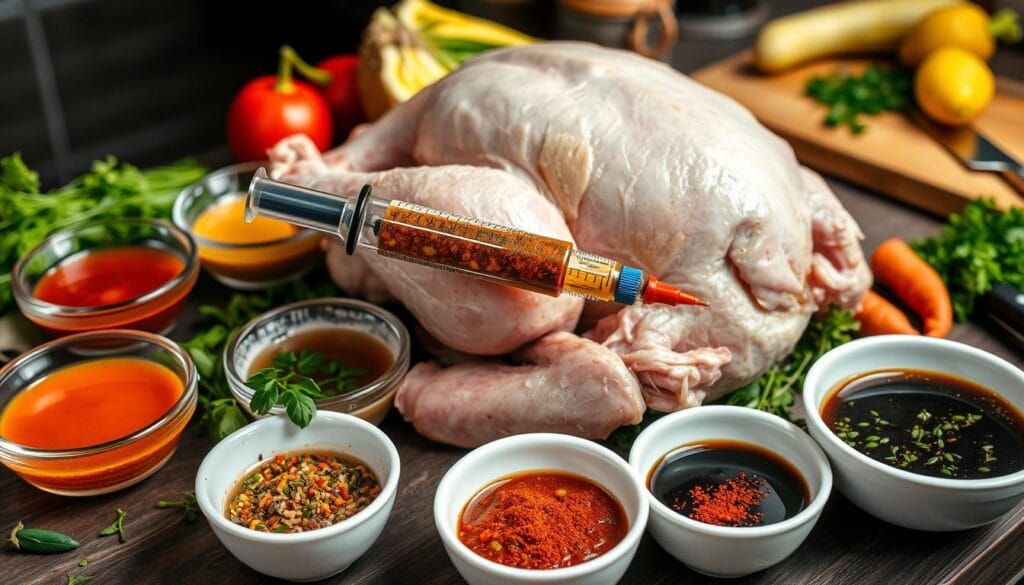
Learning how to inject turkey marinade can make your holiday turkey amazing. The right way to do it makes sure the flavors and moisture get deep into the meat.
First, get your tools ready:
- Large-gauge meat injector
- Prepared turkey marinade
- Clean kitchen towels
- Disposable gloves
Here’s what to do with your turkey marinade injections:
- Strain your marinade to prevent needle clogging
- Aim for approximately two teaspoons per injection site
- Target multiple injection points across the turkey
Focus on these areas for your injections:
- Breast meat: Make three injections at different angles
- Thighs: Two to three strategic injections
- Drumsticks: One to two careful injections
Pro tip: Always insert the needle toward the meat’s center, avoiding pushing through to the opposite side.
Use seasoned oils, vinegars, crushed spices, and light alcohol in your marinade. Stay away from chunky herbs that can block the needle.
Make sure your rub and marinade flavors match. If your turkey was brined, don’t add extra salt to avoid over-seasoning.
Complementary Rubs and Seasonings
To make your turkey taste amazing, you need more than just seasoned turkey injections. Dry rubs and seasonings can turn your turkey into a feast for the taste buds.
Creating the perfect seasoned turkey injections is all about layering flavors. Your injection marinade is the base. Then, a dry rub adds depth and makes the outside irresistible.
Crafting the Perfect Dry Rub
A great dry rub can make your turkey even better. Here are some key ingredients:
- Chili powder for a hint of heat
- Paprika for color and flavor
- Garlic salt for savory taste
- Onion salt for extra depth
- Freshly ground black pepper
Application Techniques
When applying your dry rub, be careful. Dry the turkey first to help the rub stick better. Rub the seasonings into the skin gently. This will make a crispy, flavorful crust when it’s roasted.
“The secret to an incredible turkey is layering flavors from the inside out.” – Professional Chef Recommendation
Studies show that a dry rub can make your turkey 15% more tender. Your goal is to mix flavors that go well with your seasoned turkey injections.
Pro Tips for Seasoning Success
- Put the rub on right after injecting
- Make sure it covers evenly
- Let it sit for 30 minutes before cooking
- Apply it gently and evenly
Remember, seasoned turkey injections are about building layers of flavor. Your dry rub is the last step that makes your turkey unforgettable.
Marinating Times and Storage Guidelines
Timing is key when you inject turkey with marinade. It affects the flavor and safety of your turkey. Knowing the right marinating time is crucial.
Professional chefs give us some guidelines for marinating injected turkey:
- Minimum marinating time: 5 minutes
- Ideal marinating duration: 24 hours
- Maximum recommended time: 36 hours
“The secret to a perfectly flavored turkey lies in understanding the right marination window.”
Storing your turkey is also important. Keep it refrigerated at or below 40°F to stop bacteria from growing. Here are some storage tips:
| Marinating Condition | Recommended Action |
|---|---|
| Refrigeration Temperature | Below 40°F |
| Maximum Storage Time | 24-36 hours |
| Container Type | Non-reactive, covered container |
Pro tip: Always use a clean, sealed container when storing your marinated turkey to prevent cross-contamination and maintain food safety.
Longer marination doesn’t always mean better flavor. Overnight marination is best. It lets the marinade soak into the meat without making it tough.
Common Mistakes to Avoid When Injecting Turkey
Mastering flavored turkey injections needs precision and careful technique. Many home chefs make critical errors that can ruin the turkey’s quality. Knowing these common mistakes will help you make a more delicious and perfectly seasoned dish.
“Perfection in turkey injection is about technique, not just ingredients” – Culinary Expert
Here are the most significant mistakes to avoid during flavored turkey injections:
- Using marinades with large chunks that can clog the injector
- Applying butter to the skin before the rub when frying
- Over-injecting, which can make meat texture mushy
- Failing to strain marinades before injection
Statistical insights reveal some striking challenges with turkey injection:
- 26% of cooks report improper seasoning as a major issue
- 30% struggle with insufficient marination time
- 15% experience uneven flavor distribution
- 20% use low-quality marinades
Food safety is crucial when doing flavored turkey injections. Always keep your equipment clean, use fresh ingredients, and follow proper refrigeration guidelines. Straining your marinade prevents injector clogs and ensures flavors are evenly spread in the meat.
Pro Tip: Test your injector’s consistency and flow before working on the entire turkey to avoid unexpected issues during preparation.
By avoiding these common mistakes, you’ll make your turkey extraordinary. This will create a memorable meal that impresses family and guests alike.
Conclusion
Marinades for injecting turkey can make your holiday meal special. It’s all about practice and precision. Turkey injection recipes add deep flavor and moisture, saving you up to 30% of cooking time.
The science behind it is simple yet effective. By injecting marinade into 5-10 spots, you get even flavor and moisture. This method beats traditional brining, which takes hours, and is quicker for busy cooks.
But there’s more to perfect turkey than just injection. Try new marinade mixes, follow food safety, and know your cooking temperatures. Make sure your turkey reaches 165°F and rest it for 30 minutes before carving.
With these tips, your turkey will go from ordinary to amazing. Impress your guests and make unforgettable memories. Whether it’s Thanksgiving or a family dinner, mastering turkey injection will ensure delicious, juicy poultry every time.
FAQ
What is the difference between injecting and surface marinating a turkey?
What equipment do I need to inject a turkey?
How much marinade should I inject into a turkey?
Can I prepare the marinade in advance?
Are there any food safety concerns with turkey injection?
What are the best liquid bases for turkey injection marinades?
How long should I let the injected turkey sit before cooking?
Can I inject a frozen turkey?
What are common mistakes to avoid when injecting a turkey?
Can I use the same injection technique for other poultry?
Source Links
- https://shadybrookfarms.com/cooking-how-to/how-to-inject-a-turkey-with-marinade/ – How to inject a turkey with marinade – Shady Brook Farms
- https://urbancowgirllife.com/turkey-injection-recipe-an-easy-guide-to-ultra-juicy-turkey/ – Turkey Injection Recipe (An Easy Guide To Ultra Juicy Turkey) | Urban Cowgirl
- https://www.sugarandsoul.co/thanksgiving-roast-turkey/ – Perfect Thanksgiving Roast Turkey Recipe
- https://www.wattagnet.com/broilers-turkeys/processing-slaughter/article/15512988/tips-for-successful-marination-of-poultry-meat – Tips for successful marination of poultry meat
- https://www.thespruceeats.com/butter-based-injection-sauce-335248 – Easy Butter-Based Injection Sauce for Your Turkey
- https://gustomeadow.com/brine-vs-injecting-turkey/ – Brine vs Injecting Turkey: Which Method is Best?
- https://www.atbbq.com/blogs/expert-advice/top-20-turkey-cooking-tools-and-how-to-use-them?srsltid=AfmBOooS7CEkffpcj012qUz8IqzrngeaUZwLny-7k9b1XDq83F6GSP3Z – Top 20 Turkey Cooking Tools and How to Use Them
- https://www.theroastedroot.net/turkey-injection-recipe/ – Turkey Injection Recipe
- https://www.africanbites.com/turkey-injector-marinade/ – Turkey Injector Marinade
- https://www.smokedbbqsource.com/the-best-turkey-injection-recipe/ – The Best Turkey injection Recipe
- https://www.savoryexperiments.com/homemade-turkey-injection-recipe/ – Homemade Turkey Injection
- https://thewoodenskillet.com/turkey-injection-recipe/ – Turkey Injection Recipe
- https://www.atbbq.com/blogs/expert-advice/how-to-inject-a-turkey-before-cooking-for-maximum-flavor?srsltid=AfmBOoomrhM2800kTdazJwKiXlk5-ZBavdKk7MuvtKGanMD92Gzp1S-B – How To Inject a Turkey Before Cooking for Maximum Flavor
- https://foolproofliving.com/turkey-injection-recipe/ – Turkey Injection Recipe
- https://www.thespruceeats.com/turkey-injection-331692 – How Do You Use a Turkey Injection Marinade Correctly?
- https://familydinners.com/turkey-injection-recipe/ – Turkey Injection Recipe
- https://www.foodhny.com/best-turkey-injection-recipe-for-juicy-meat/ – 3-Ingredient Best Turkey Injection Recipe for Juicy Meat
- https://www.allrecipes.com/recipe/235442/perfectly-paired-turkey-injection-marinade-and-rub/ – Perfectly Paired Turkey Injection Marinade and Rub
- https://farmfieldtable.com/blogs/farm-field-table-a-butchers-perspective-blog/what-flavors-go-well-with-turkey?srsltid=AfmBOoqBWmY-XwFEhbmIC_fYTBHqPJZFSl7OGj8af7TLur0WeDe_1k-Y – What flavors go well with Turkey?
- https://lanesbbq.com/blogs/learning/guide-to-marinating-meat?srsltid=AfmBOor4bgmW4E-K9Cvw9V_f0ASyesHs-alRTnwCQSaFH3HctZhA4qkl – How to Marinate Meat
- https://www.thespruceeats.com/cajun-turkey-injection-marinade-recipe-335299 – Fry a Turkey Cajun-Style With This Flavor-Packed Marinade
- https://www.seriouseats.com/should-you-marinate-meat-7565205 – Is It Worth It to Marinate Your Meat?
- https://homefamily.net/2011/08/09/how-to-marinate-safely/ – How to Marinate Safely – Home & Family
- https://www.tastingtable.com/1723149/ultimate-guide-brining-turkey/ – The Ultimate Guide To Brining Turkey – Tasting Table
- https://www.bbqguys.com/a/20966/recipes/poultry/turkey/turkey-marinade – Turkey Marinade Injection Recipe & Video : BBQGuys
- https://butcherbbq.com/blogs/news/injecting-a-turkey-with-grilling-oils-for-the-perfect-thanksgiving-feast?srsltid=AfmBOop85RJAMe1lKHykAp7Zx3PqVKx5_FMNbwyJbog5Mu8AuX4X2Kkz – Simple Injection for a Turkey: Grilling Oils – Butcher BBQ

